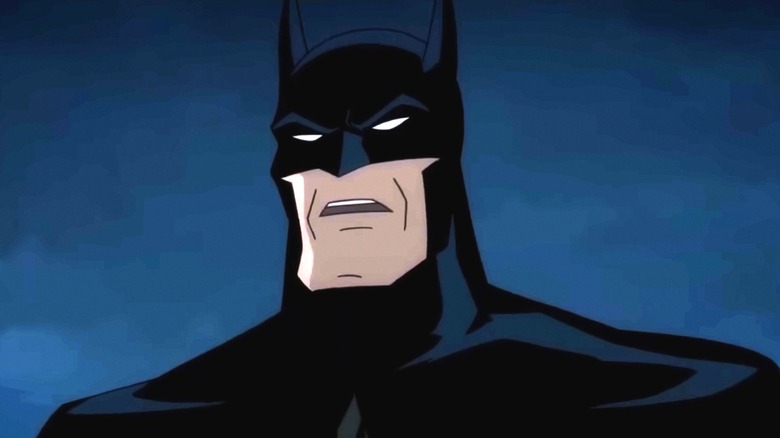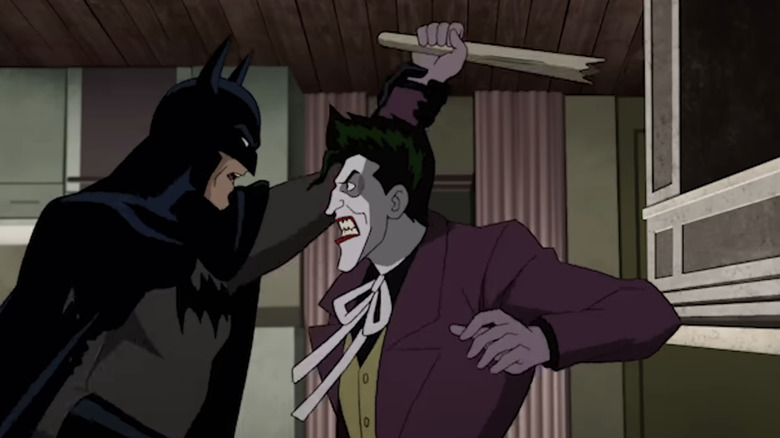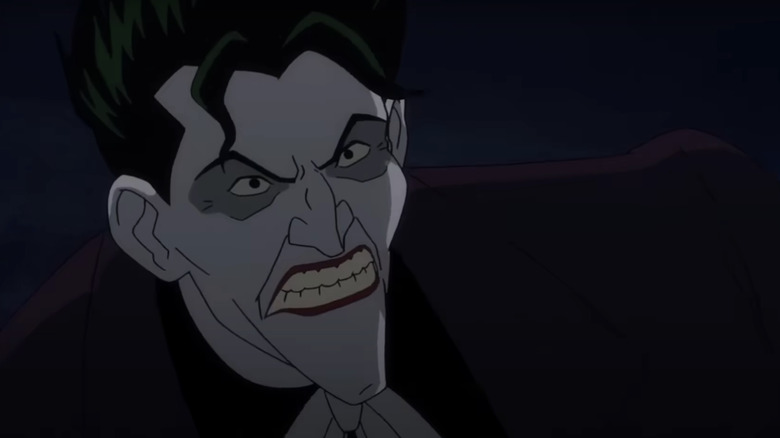This Controversial Batman Animated Movie Kickstarted A New Era For DC
Alan Moore and Brian Bolland's 1988 graphic novel "Batman: The Killing Joke" is a legendary entry in the Batman canon that has influenced countless interpretations of the Dark Knight. Not only did it add major elements to Batman lore, including the shooting of Barbara Gordon and what is now widely accepted as the Joker's origin, it influenced even more popular depictions of the Batman mythos. Director Tim Burton cited "The Killing Joke" as a big inspiration for 1989's "Batman," even going so far as to claim Moore's graphic novel was the first comic book he ever really loved. Later, Christopher Nolan borrowed major elements from the story for "The Dark Knight," most notably Joker's hazy past and unreliable narration whereby we never truly know if the villain is recounting his origin story accurately or not.
This is to say nothing of the way in which "The Killing Joke," alongside seminal works such as Frank Miller's "The Dark Knight Returns," helped re-establish Batman as the "weird figure of the dark" that original creators Bill Finger and Bob Kane had intended. Add in the fact that Moore helped introduce the now-popular idea of Batman and Joker being mirror images of one another, and you've got one of the most influential and important Batman stories ever written.
With that in mind, you can imagine that producer Bruce Timm was more than a little hesitant to make an animated adaptation of "The Killing Joke." After all, doing such a seminal work justice was always going to be difficult. But Timm had been given a lot of creative control on his projects ever since he and co-creator Eric Radomski spearheaded the now legendary "Batman: The Animated Series." "The Killing Joke" was no different in that sense. In fact, Warner Bros. Animation was willing to let Timm go as dark as he needed in order to make a worthy adaptation of Moore's story. The resulting film represented the first ever R-rated Batman movie and the first ever R-rated Warner Bros. Animation film. Lamentably, it also proved controversial and didn't fare too well with critics.
The Killing Joke should have been a big success
"Batman: The Killing Joke" looked perfect on paper. Not only was Bruce Timm producing, but Kevin Conroy, the definitive voice of Batman, was onboard to once again voice the Dark Knight, having established himself as the greatest to ever do it with "Batman: The Animated Series." What's more, Mark Hamill, who turned what was originally supposed to be a quick "BTAS" cameo into a career playing the Joker, had also signed on. Alongside Tara Strong as Barbara Gordon/Batgirl and Ray Wise as Commissioner Gordon, the cast couldn't have been better (though Conroy did recall the recording sessions being absolute madness).
Meanwhile, Warners was clearly willing to give Timm and his team the creative freedom they needed. As Entertainment Weekly reported at the time, "The Killing Joke" received its R rating and the studio supported the movie being as mature as it needed to be in order to do justice to the original story. Sam Register, president of Warner Bros. Animation & Warner Digital Series, was quoted in a statement at the time saying, "From the start of production, we encouraged producer Bruce Timm and our team at Warner Bros. Animation to remain faithful to the original story — regardless of the eventual MPAA rating." Evidently, the studio was eager to produce an animated film that "authentically represented" Alan Moore's original story. While the maturity of the graphic novel certainly wasn't lacking from the finished film, whether Timm and his team managed to "authentically represent" that original story remains up for debate, as "The Killing Joke" proved controversial upon its debut — and not because of its adult sensibilities.
Released in 2016, "Batman: The Killing Joke" wasn't just the first R-rated Batman movie (unless you count the extended home-video version of "Batman v Superman: Dawn of Justice"), it was the first DC animated movie to receive such a rating — which is surprising considering it was the 27th DC Universe Animated Original Movie. In that sense, it began a new era for DC Animated films, with 14 more R-rated projects following in its footsteps (12 if you don't include the "Watchmen" animated movies). Of course, we'd also see several live-action R-rated DC movies arrive in subsequent years, from James Gunn's "The Suicide Squad" to "Zack Snyder's Justice League" and "Joker." But "The Killing Joke" was the first. Sadly, that's about all it can claim in terms of breaking new ground.
Darker doesn't always mean better when it comes to Batman
Directed by Sam Liu and written by Brian Azzarello, "Batman: The Killing Joke" premiered at San Diego Comic-Con in 2016 before a brief theatrical run that saw it bring in $4.3 million at the box office. That did make it the only animated Batman film to get a theatrical release since "Batman: Mask of the Phantasm" (a film that contains Kevin Conroy's greatest Batman moment). But according to critics, it perhaps wasn't quite worthy of such an honor.
At issue were the changes made to the original storyline, which, as Bruce Timm pointed out prior to the film's release, simply wasn't long enough to adapt into a feature length film. As such, he and the writers introduced new elements, including a relationship between Batman and Barbara Gordon that proved divisive to say the least. As Ben Travers of IndieWire wrote in his review,
"Filling out [Barbara's] role could have created a direct attachment between Barbara and Batman, but instead of humanizing her, it turns Barbara/Batgirl into a comic book cliche: The female character that feigns complexity, but, when given an expanded role, is only viewed through a sexual lens."
Other critics felt the extended first half was too disconnected from the rest of the film, and some even criticized the animation for failing to live up to Brian Bolland's celebrated art style from the original graphic novel, all of which resulted in a 35% Rotten Tomatoes score based on 36 reviews. Not exactly what you'd hope for given this was the first time the Batman animators were afforded the freedom to go as dark as needed. That seems like something that could have been uniquely valuable to a Batman movie. Alas, "The Killing Joke" proved that darker doesn't necessarily always mean better when it comes to the Dark Knight.


